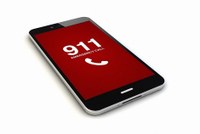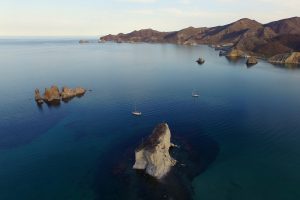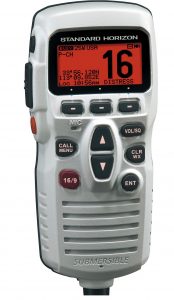Communications: The Power of VHF
The demise of the use of VHF amongst the cruising community is causing lots of issues with security on boats as more and more cruisers rely on other means of communication including social media, starlink, mobile phones and the internet. Carolyn Shearlock of The Boat Galley looks at several reasons why VHF should be the preferred method of communication.
Published 2 years ago
These days, it’s second nature for many of us to turn to social media or texting when we need assistance or want to share information. But when it comes to boating, a VHF radio remains significantly more reliable and effective for seeking help or local boating information.
So many times I see a question posted in a Facebook group that would have done better as a VHF hail to local boaters. “Where can I buy ___ near ____?” “Is there someone who could give me a ride to shore?” “There is a boat dragging in the anchorage – anyone know how to contact the owner?”
Four reasons why using the VHF is better
Immediate Response in Emergencies:
VHF radios are designed for instant, clear communication in the marine environment. In an emergency, a distress call via VHF radio reaches not only the Coast Guard but also other boaters in the vicinity who can provide immediate assistance. People hear you as soon as you put out the call, unlike waiting for someone to check Facebook, their email, or their texts.
One to Many:
While Facebook may also be a form of one-to-many communication, texting, emailing, or phoning isn’t. You’re limited to the help that the one person you’re contacting can provide.
Local Answers:
The people who reply are nearby, by definition. They’re likely to have up-to-date local knowledge. If you need a helping hand, they’re the closest.
Reliable in Remote Areas:
Cellular signals can be weak or non-existent in remote boating areas, making it difficult or impossible to send texts or use social media. You might post something and then be unable to see replies.
VHF radios, however, use radio frequencies that are not dependent on cell towers, ensuring that you can communicate even in the most secluded spots.
Cellphones predominate
For the VHF to work in emergencies and to get local knowledge, boaters have to turn the radio on and leave it on. When we began cruising over 20 years ago, the VHF was the primary way of communicating between boats. Now, as cell phones work in more and more places, we see a lot of boaters using them instead of VHF.


That’s not bad, for certain types of communication. But it’s not so good for times when you need help. When you need something, think whether maybe the VHF is the best way to get it. Ditto when you just want to contact nearby boaters, maybe with a “sunset alert” for a particularly good sunset or an invitation to a beach barbecue. And the rest of the time? Leave your radio on so you can potentially help others.
VHF v Instagram
I wrote this for a situation here in the West Palm Beach anchorage. A young couple, new cruisers, somehow lost their anchor. In light winds, they drifted over to the City Dock and tied up. They wanted to borrow an anchor until they found theirs so they could get off the dock.
Instead of calling on the VHF, they messaged a friend who was 50 miles away, who then contacted me via Instagram. Since I’m on land, with no VHF, I then texted three boats that I knew were in the anchorage and they were able to arrange help. On one hand, it’s a great story of how people are willing to help. On the other, it’s an example of how horribly convoluted it becomes to arrange help: it took a couple of hours for help to arrive instead of just minutes if they’d used their VHF.
Turn on VHF and Keep it On
When in locales with little support aside from other cruisers, it’s critical to keep your radio on the hailing channel (usually 16) 24 hours a day.
I remember an incident in the Sea of Cortez, back in 2004. A large trawler, The Cat’s Meow, went on the rocks shortly after sunset in a remote anchorage. Other boats there tried to pull her off but were unsuccessful and the owners had to abandon ship as she was listing precariously. Around midnight, they called friends on land to bring a high-volume pump because the boat was taking on water.
A Mexican Navy frigate heard (on VHF) and said they were on their way to help. Many other cruisers had heard as well (on VHF) – in the middle of the night – and relayed the information to still more: by dawn, there were 25 boats on site to help; more poured in all day. It took five days, but The Cat’s Meow was saved.
Fast-forward 11 years to another boat in trouble, this time in the Chagos Archipelago. Behan Gifford tells the story: “We were with just a handful of boats (e.g., no worries about noisy chatter) in an uninhabited atoll in the Indian Ocean, when a pre-dawn squall put a boat 1/4 mile over the reef. Immediate action/ rescue was required, but only two boats (us and an Aussie boat) had radios on to respond. We had to dinghy around to the others to rally help.”


Kim White from the Caribbean Safety and Security Net comments: “VHF is sadly underutilized. A key point is the DSC capability of the VHF. This allows boaters to send and receive digital messages, including distress calls. This can be a lifesaver in an emergency, as it allows boaters to quickly and easily identify each other and coordinate rescue efforts. The radio must be on to use DSC, however, the volume can be very low and it will still scream. So the usual complaint about lots of chatter at night when sleeping is moot. In an emergency use of the air horn and flashing your nav lights on/off is also a way to get attention – most will look out of curiosity and maybe then turn on the VHF. I asked at a cruiser dinner this week if anyone had VHF on, all said no, and most admitted they would not know what channel to use – except to call the Coast Guard.”
What if no-one responds?
How would you feel if you called for help in an emergency, knew there were nearby boats and no one responded?
I was discussing this with Nica Waters, presently in the Bahamas, and she said the number of boaters there who don’t even turn their VHF on when underway is shocking. Just yesterday, she did an “experiment” to see if any nearby boaters had their radios on while at anchor. She called for an impromptu get together at the Pipe Creek beach. Despite there being a dozen boats in the anchorage, not one replied or showed up.
The lack of VHF usage is a problem for a couple of reasons:
- The first is obviously the delay or impossibility of getting help when needed.
- The second is building community – not hearing the voices of your neighbors and not getting to know them via VHF.
And that, I think, makes it a circular problem: people don’t leave their radio on, don’t use it, don’t participate in the nets and so don’t get to know their neighbors, and thus don’t feel it’s so critical to be ready to help in an emergency.
If you want others to be there if you need help, you have to be available to them as well.
Leave your radio on the local hailing channel!


…………………………………
Related Links:
…………………………………
The opinions expressed in this article are the author’s own and do not reflect the view of Noonsite.com or World Cruising.
…………………………………
Find out all news, reports, links and comments posted on Noonsite, plus cruising information from around the world, by subscribing to our FREE monthly newsletter. Go to https://www.noonsite.com/newsletter/.
Related to the following Cruising Resources: Anchorages, Communications, Communications Equipment, Cruising Information, Cruising Networks, Cruising Radio Nets, Electrics and Electronics, Equipment, General, General Services, Insights, Liveaboard Tips, Piracy & Security, Safety, Safety and Medical, Services and Equipment




It’s sad, but I agree that it is a tool whose use is becoming much more sporadic.
For most of my sailing life, I’ve had the VHF switched on 24/7., and been very glad to have it.
Sailing thorugh SE Asia changed everything, though. Sadly, many people especially on commercial vessels, feel like it’s fun to broadcast rubbish over channel 16. The problem seems worse at night, when (I’m guessing) lonely night watch keepers decide to sing over Channel 16, or make animal noises, for their own entertainment.
There’s nothing you can do to stop it (believe me, I tried), and I ended up turing the volume down, or the set off entirely. This went on for so long that it fundamentally undermined my habit of having the radio on at all times.
Once we left the area and started making our way throug the Indian Ocean, the set went back on (and still remains on when on passage), but even outside of SE Asia, there’s so much inane chatter that it becomes a permanent nusiance when at anchor.
Here in the UK it’s not so much monkey noises or singing that spoils the peace, but the incessant requirement by day sailors for radio checks. I don’t know who decided to initiate this practice, but not only is it practically pointless, it’s non stop and fills the airwaves to the point of distraction.
Rant over 🙂
In Canada vhf certification is required by law and all the points covered in this areticle are taught in the course that users are required to take. The Canadian Power and Sail Squadrons are the developers and authorized distributors of the course. We have recently renewed the course and made it into an online self study course. You can find it at http://CPS-eco.org Eric Phinney, National Education Officer